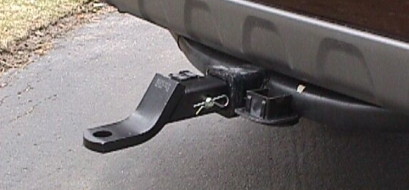Trailer Hitches
Whether you are looking to pull a boat, camper, trailer or even another automobile, there is one thing you will very likely need, a trailer hitch.
At Auto Kruser's we are experts when it comes to installing trailer hitches. There are many things to be aware of when it comes to installing your trailer hitch so that it operates safely, comfortably and without abusing the towing vehicle.
At Auto Kruser's we’re experienced in an entire range of vehicle hitch installations, including all types of trailer hitches. We take into account your towing vehicle and what you plan on towing to make sure that we install the correct trailer hitch for you, your vehicle and the load you are going to tow.
The trailer hitch that you choose can affect your handling, braking, traction and wear and tear on your equipment. Choices range from standard hitches to fifth-wheel hitches to gooseneck hitches and are available in all sorts of brands and sizes.
For over thirty years the guys at Auto Kruser's have been servicing all types of cars, vans, SUVs and light trucks. We service vehicles old and new, large and small, foreign and domestic.
Just drive over to Auto Kruser's or call and make an appointment. We’ll hitch you up and get you on your way.
Tips on How To Tow a Trailer
The weight capacities of the tow vehicle, the trailer hitch, ballmount, ball, and safety chains must not be exceeded by the gross trailer weight (GTW). The towing system will only be as strong as the weakest piece.
Gross Trailer Weight (GTW) - the weight of the loaded trailer. To determine GTW, weigh the loaded trailer on a vehicle scale.
Tongue Weight (TW) - the downward pressure placed on the ball by the coupler. On smaller trailers the TW can be measured using a bathroom scale and a box. On a level surface, place the coupler of the loaded trailer on the scale at normal towing height (Figure A). For heavier tongue weights, use the method diagrammed below (Figure B) or use a tongue weight scale.
Trailer Loading
The way you load the trailer can determine how easy you can tow it. While loading, keep in mind that the tongue weight should be 10% to 15% of the overall trailer weight. One of the main causes of trailer sway is not having a large enough percentage of trailer tongue weight compared to gross trailer weight. To help prevent the trailer from swaying back and forth, a few things can be done. Try placing heavier cargo in the front of the trailer, ahead of the trailer's axle. Also center the cargo left-to-right and use tie-downs to keep the load from sliding.
Trailer Sway can also lead to a loss of vehicle control. When starting out with a new load on a trailer, make sure it will not sway by gradually increasing your speed in intervals until highway speed is reached. If the trailer does begin to sway, try adjusting the cargo and equipment accordingly and then repeat the test. If repositioning the load and equipment did not help reduce the sway, a sway control or a weight distribution system with sway control may be needed.
Driving
The addition of a trailer adds weight and length to the tow vehicle. More weight means more time to speed up and more importantly, slow down. Overall handling is also affected. When towing, allow for extra time when switching lanes, stopping and passing other vehicles. To assist in slowing down, trailer brakes are a very good option. The extra length can also cause problems on turns. Because the trailer does not follow the exact path as the vehicle on turns, remember to swing out wider when traveling around bends and corners.
To conserve fuel when towing, travel at moderate speeds. Faster speeds increase wind resistance, reduce gas mileage, and place added strain on the vehicle and trailer. When traveling over large hills or down gravel roads, use a lower gear to ease transmission and engine operation. Shifting out of overdrive and into a lower gear may also improve vehicle gas mileage.
Be extra cautious of potholes and other large bumps. Riding over one can damage the tow vehicle, trailer hitch and/or trailer. When pulling a trailer take your time and be careful.
If for some reason (a gust of wind, a downgrade, a pass by a larger vehicle, etc.) the trailer does begin to sway, the driver needs to assess the situation to determine the proper course of action.
Here is a list of Do's and Don'ts to think about:
Do's - Good Towing Practice
Gradually reduce speed Steady the steering wheel - sudden turns can cause more sway Apply only the trailer brakes to help reduce trailer sway
Don'ts - NOT Good Towing Practice
Do Not slam on the brakes - jackknifing could occur Do Not attempt to steer out of a sway situation Do Not increase speed - Trailer sway increases in faster speeds Do Not tow a trailer that continues to sway; consider reloading the trailer or perhaps adding a sway control or a weight distribution system with sway control
For expert car care and repair, "Don’t Worry… Call Auto Kruser's!"
That's… Kruser with a 'K', Cool guys with a 'C'


